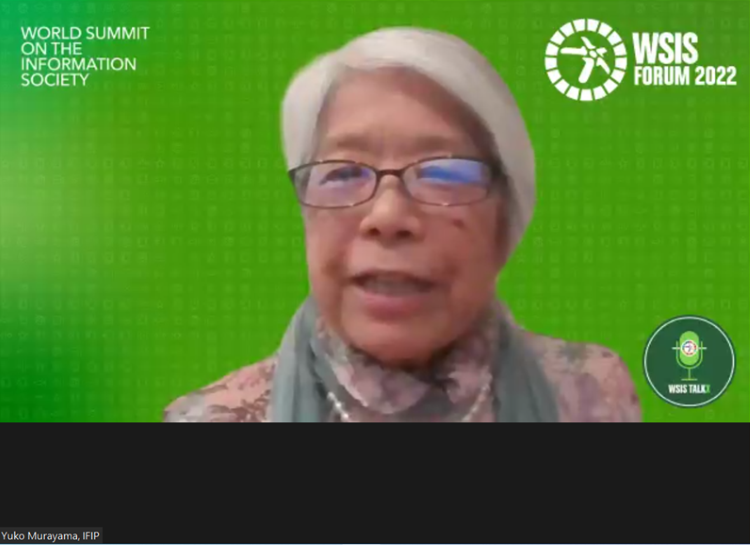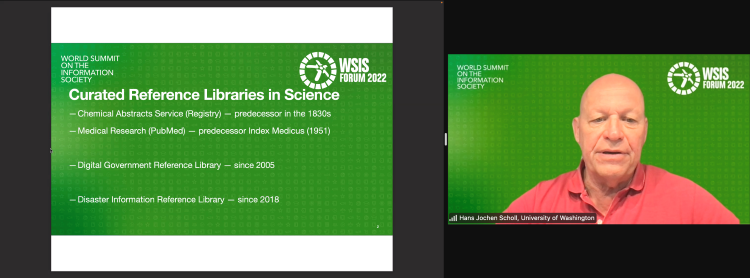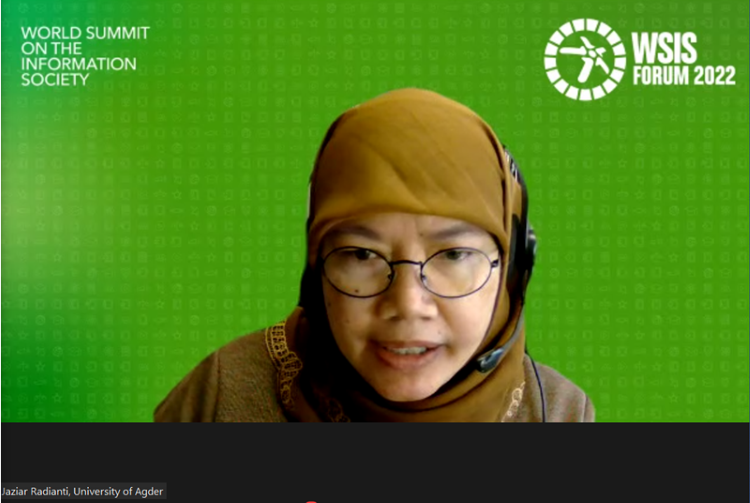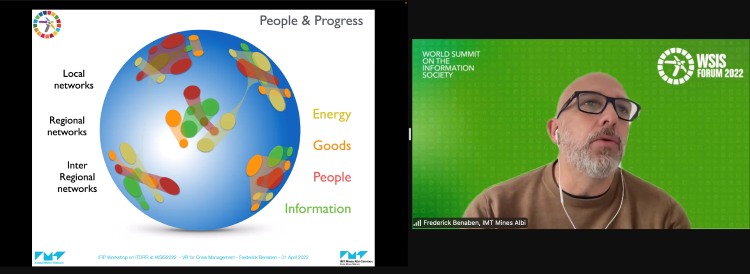IT in Disaster Risk Reduction (ITDRR)
International Federation for Information Processing (IFIP)
Session 157
Situation Awareness at Disaster
Due to the global environmental changes, we have had many and different types of natural disasters recently, such as flood, wildfire, earthquake, tornados, volcano eruption and tsunami. This year, our workshop shall look into the aspect of situation awareness at disaster. In the recent volcanic eruption under the sea in Tonga, it was hard to get the initial situations due to the loss of communication links. Moreover, due to COVID-19 threats, support from outside the country needed a great care.
We have three panelists from IFIP WG5.15 as well as from ISCRAM (the Information Systems for Crisis Response and Management) community, Frederick Benaben, Hans Jochen Scholl and Jaziar Radianti shall discuss situation awareness in their contexts.
Workshop Programme
-
12:00-12:05 Introduction to the workshop
-
Yuko Murayama (IFIP WG5.15 Chair)
-
- 12:05-12:20 Identifying Topical Directions in the Current Body of Knowledge in ITDDR
-
Hans Jochen Scholl (University of Washington, U.S.A.)
-
-
12:20-12:35 Digital Maps for Enhancing SA and Common Operational picture: Lessons-learned from a Digital Table Top Exercise
-
Jaziar Radianti (University of Agder, Norway)
-
-
12:35-12.50 Virtual Reality in Crisis Training and Management
-
Frederick Benaben (IMT Mines Albi, France)
-
-
12:50-13:00 Q&A

Professor Emeritus, Iwate Prefectural University, Japan
Researcher, Institute for Mathematics and Computer Science, Tsuda University, Japan
She had Ph.D. from University of London (attended Dept. of Computer Science, University College London). Her research interests include networking, security, the sense of security, trust and disaster informatics as well as inclusive computing.

Jochen serves as a Full Professor with tenure in the Information School at the University of Washington, Seattle, WA. From the University of Albany, NY/SUNY he earned a Ph.D. in Information Science. He also holds a Master's degree in Business Administration from the GSBA Zurich, Switzerland. His research interests are focused on disaster information management, smart governance/government, and information artifact evaluation.
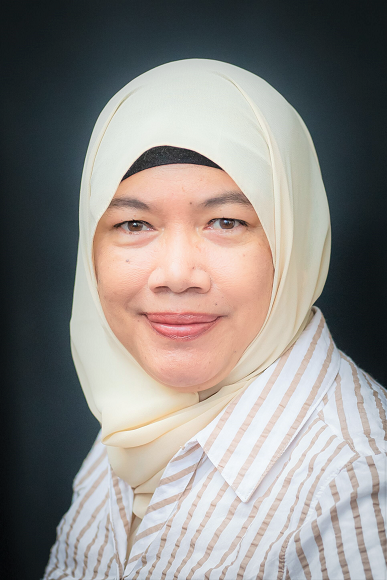
Dr. Jaziar Radianti is an associate professor at the Department of Information Systems at the University of Agder. She received a Ph.D. in System Dynamics applied for information security from the University of Bergen, in a cooperation with the University of Agder, Norway (2010). She has been working on research in the disaster management area since 2012. Her research interests are situational awareness, command-and-control, technology-supported emergency management, modeling and simulation, disaster resilience, and information security management and privacy. She is a member of the Centre for Integrated Emergency Management (CIEM) and has been participated in several regional, national, and EU research projects. Jaziar has published more than 90 peer-reviewed articles in leading conferences and journals.
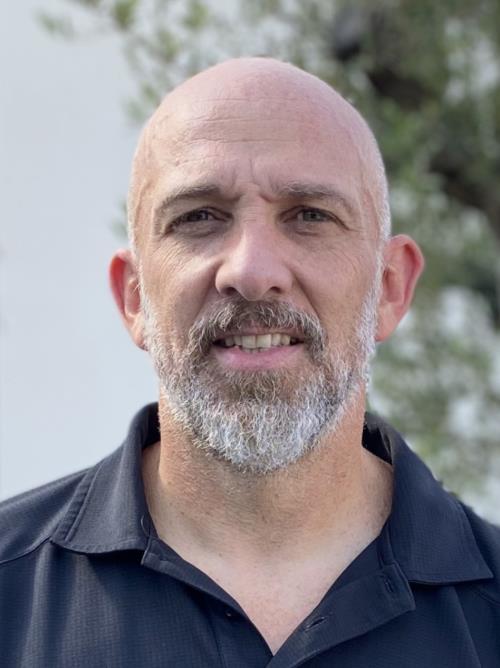
Frederick BENABEN is Professor at the Industrial Engineering Center of IMT Mines Albi (15 faculties, 5 engineers and assistants, 30 PhD and Post-Doc. fellows).
He is since 2019 the head of the Safety and Crisis Management Lab of the Industrial Engineering Center of IMT Mines Albi (around 20 researchers including professors, assistant/associate-professors, engineers, PhD and Post-Doc students).
He is also since 2019 the co-director (with Prof. Benoit Montreuil) of the Associated International Lab SIReN (Sentient Immersive Response Networks Lab) between IMT Mines Albi and Georgia Tech.
-
 C1. The role of governments and all stakeholders in the promotion of ICTs for development
C1. The role of governments and all stakeholders in the promotion of ICTs for development
-
 C2. Information and communication infrastructure
C2. Information and communication infrastructure
-
 C3. Access to information and knowledge
C3. Access to information and knowledge
-
 C4. Capacity building
C4. Capacity building
-
 C5. Building confidence and security in use of ICTs
C5. Building confidence and security in use of ICTs
-
 C6. Enabling environment
C6. Enabling environment
-
 C7. ICT applications: benefits in all aspects of life — E-government
C7. ICT applications: benefits in all aspects of life — E-government
-
 C7. ICT applications: benefits in all aspects of life — E-business
C7. ICT applications: benefits in all aspects of life — E-business
-
 C7. ICT applications: benefits in all aspects of life — E-learning
C7. ICT applications: benefits in all aspects of life — E-learning
-
 C7. ICT applications: benefits in all aspects of life — E-health
C7. ICT applications: benefits in all aspects of life — E-health
-
 C7. ICT applications: benefits in all aspects of life — E-employment
C7. ICT applications: benefits in all aspects of life — E-employment
-
 C7. ICT applications: benefits in all aspects of life — E-environment
C7. ICT applications: benefits in all aspects of life — E-environment
-
 C7. ICT applications: benefits in all aspects of life — E-agriculture
C7. ICT applications: benefits in all aspects of life — E-agriculture
-
 C7. ICT applications: benefits in all aspects of life — E-science
C7. ICT applications: benefits in all aspects of life — E-science
-
 C8. Cultural diversity and identity, linguistic diversity and local content
C8. Cultural diversity and identity, linguistic diversity and local content
-
 C9. Media
C9. Media
-
 C10. Ethical dimensions of the Information Society
C10. Ethical dimensions of the Information Society
-
 C11. International and regional cooperation
C11. International and regional cooperation
Disasters are considered in Action Lines C2 and C10, however, all the Action Lines could have disaster issues as well.
C1. Disaster management is one of the important risk management issues at governments as well as all stakeholders in the promotion of ICTs for development
C2. The availability of information and communication infrastructure is important for disaster resposne.
C3. Access to information and knowledge is important for situation awareness at disaster.
C4. Capacity building is needed for preparation and mitigation for disaster.
C5. Building confidence and security in use of ICTs for disaster communications including privacy issues.
C6. Enabling environment is closeley related to natural disaster.
C7. Disaster management required all the relevant ICT applications: benefits in all aspects of life — E-government, E-business, E-learning, E-health, E-employment, E-environment, E-agriculture and E-science.
C8. Cultural diversity and identity, linguistic diversity and local content: Disaster information should be shared by every citizen in the world for future preparedness and mutual support.
C9. Media is important once disaster happens to inform people of the current situations.
C10. Ethical dimensions of the Information Society: Ethical issues are important at disaster not to spread biased misinformation.
C11. International and regional cooperation is essential once a catastrophe occurs.
-
 Goal 1: End poverty in all its forms everywhere
Goal 1: End poverty in all its forms everywhere
-
 Goal 2: End hunger, achieve food security and improved nutrition and promote sustainable agriculture
Goal 2: End hunger, achieve food security and improved nutrition and promote sustainable agriculture
-
 Goal 3: Ensure healthy lives and promote well-being for all
Goal 3: Ensure healthy lives and promote well-being for all
-
 Goal 4: Ensure inclusive and equitable quality education and promote lifelong learning opportunities for all
Goal 4: Ensure inclusive and equitable quality education and promote lifelong learning opportunities for all
-
 Goal 5: Achieve gender equality and empower all women and girls
Goal 5: Achieve gender equality and empower all women and girls
-
 Goal 6: Ensure access to water and sanitation for all
Goal 6: Ensure access to water and sanitation for all
-
 Goal 7: Ensure access to affordable, reliable, sustainable and modern energy for all
Goal 7: Ensure access to affordable, reliable, sustainable and modern energy for all
-
 Goal 8: Promote inclusive and sustainable economic growth, employment and decent work for all
Goal 8: Promote inclusive and sustainable economic growth, employment and decent work for all
-
 Goal 9: Build resilient infrastructure, promote sustainable industrialization and foster innovation
Goal 9: Build resilient infrastructure, promote sustainable industrialization and foster innovation
-
 Goal 10: Reduce inequality within and among countries
Goal 10: Reduce inequality within and among countries
-
 Goal 11: Make cities inclusive, safe, resilient and sustainable
Goal 11: Make cities inclusive, safe, resilient and sustainable
-
 Goal 12: Ensure sustainable consumption and production patterns
Goal 12: Ensure sustainable consumption and production patterns
-
 Goal 13: Take urgent action to combat climate change and its impacts
Goal 13: Take urgent action to combat climate change and its impacts
-
 Goal 14: Conserve and sustainably use the oceans, seas and marine resources
Goal 14: Conserve and sustainably use the oceans, seas and marine resources
-
 Goal 15: Sustainably manage forests, combat desertification, halt and reverse land degradation, halt biodiversity loss
Goal 15: Sustainably manage forests, combat desertification, halt and reverse land degradation, halt biodiversity loss
-
 Goal 16: Promote just, peaceful and inclusive societies
Goal 16: Promote just, peaceful and inclusive societies
-
 Goal 17: Revitalize the global partnership for sustainable development
Goal 17: Revitalize the global partnership for sustainable development

